TAQA Bundle
Unveiling TAQA: How Does This Energy Giant Operate?
Abu Dhabi National Energy Company (TAQA) isn't just another utility; it's a powerhouse reshaping the energy landscape. With impressive 2024 financial results, including a 6.7% year-on-year revenue increase, TAQA's integrated operations span power generation, water desalination, and oil and gas. But how does this multifaceted TAQA SWOT Analysis shape its strategy?
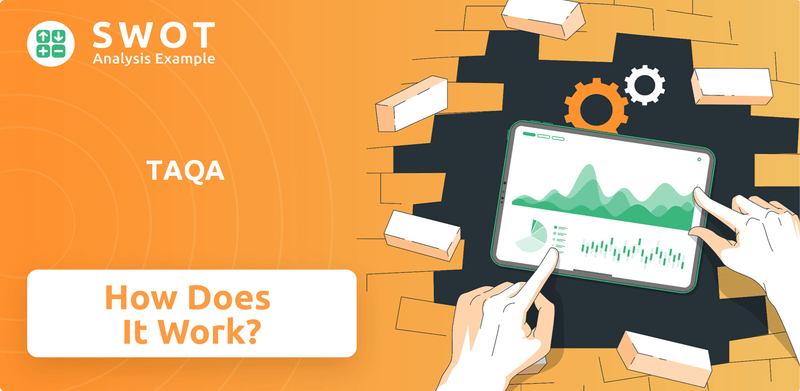
Understanding TAQA's
What Are the Key Operations Driving TAQA’s Success?
The TAQA Company creates value through a diverse portfolio that includes power generation, water desalination, transmission and distribution, and oil and gas operations. Its core offerings cover electricity generation from various sources, including thermal and renewable energy, along with the production of desalinated and recycled water. These services are provided to a wide range of customers, from residential and commercial users to industrial clients who need reliable energy and water supplies.
Operationally, TAQA operations encompass the entire value chain. In power generation, this involves managing and maintaining power plants, including highly efficient combined cycle gas power plants. For water, the company manages large-scale desalination plants and is responsible for wastewater collection and treatment through TAQA Water Solutions. The transmission and distribution businesses, such as TAQA Distribution, ensure the reliable delivery of power and water to end-users.
The TAQA business model integrates traditional energy and water services with a strong focus on decarbonization and renewable energy. The company's commitment to advanced technologies, like reverse osmosis for water desalination, which uses significantly less energy than traditional methods, highlights its dedication to efficiency and sustainability. This integrated approach and focus on technology translate into customer benefits through reliable, increasingly low-carbon, and efficient utility services.
TAQA generates electricity from various sources, including thermal and renewable energy. This includes operating and maintaining power plants, such as the highly efficient combined cycle gas power plants. The company is expanding its renewable energy portfolio to reduce carbon emissions.
TAQA manages large-scale desalination plants, including the Taweelah Reverse Osmosis (RO) Independent Water Plant, one of the world's largest. It also handles wastewater collection and treatment through TAQA Water Solutions. This ensures a reliable water supply for various customers.
TAQA's transmission and distribution businesses ensure the reliable delivery of power and water to end-users. TAQA Distribution, formed from the merger of Abu Dhabi Distribution Company and Al Ain Distribution Company, plays a crucial role. This is vital for consistent utility services.
TAQA is involved in oil and gas operations, which contribute to its diversified portfolio. These operations support the company's overall energy production capabilities. This sector adds to the company's financial and operational scope.
TAQA's operations are characterized by an integrated utility model, combining traditional energy and water services with a strong push towards decarbonization and renewable energy. The company's focus on efficiency and sustainability is evident in its use of advanced technologies, such as reverse osmosis for water desalination.
- TAQA's Taweelah RO plant has a capacity of 200 MIGD, showcasing its large-scale operations.
- The company is actively investing in renewable energy projects, increasing its sustainability efforts.
- Partnerships with companies like JERA and Al Bawani support its power projects in Saudi Arabia.
- TAQA's integrated approach ensures reliable, low-carbon, and efficient utility services for its customers.
TAQA SWOT Analysis
- Complete SWOT Breakdown
- Fully Customizable
- Editable in Excel & Word
- Professional Formatting
- Investor-Ready Format
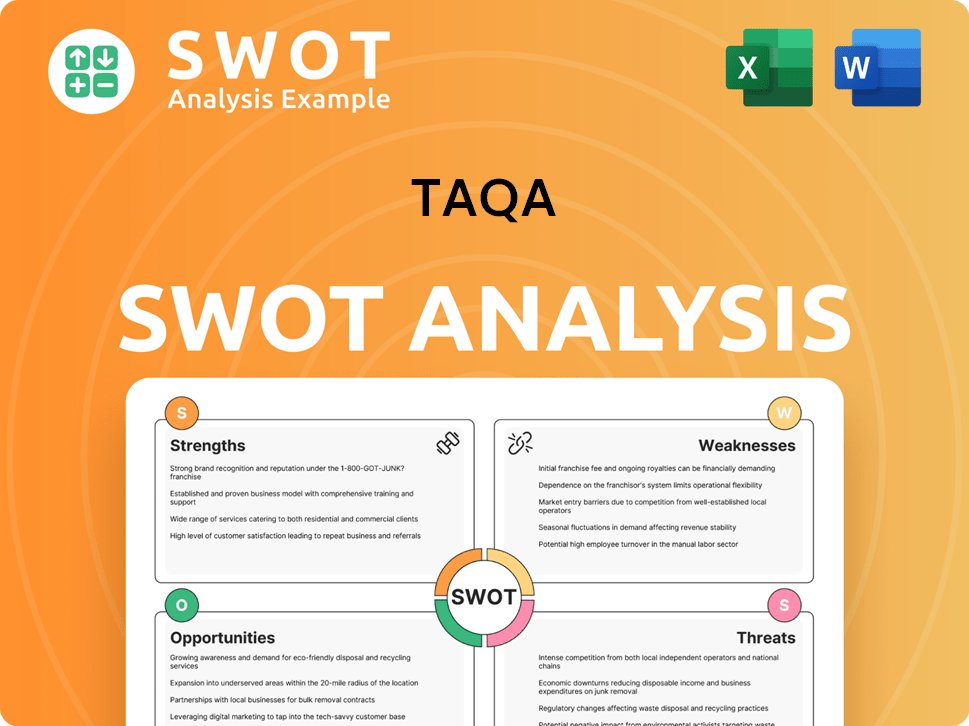
How Does TAQA Make Money?
The Abu Dhabi National Energy Company (TAQA) generates revenue through diverse streams, primarily from its integrated utilities and energy operations. Its business model is centered on providing essential services, with a focus on power generation, water desalination, and oil and gas exploration.
For the full year ending December 31, 2024, TAQA reported group revenues of AED 55.2 billion (approximately $15.0 billion), marking a 6.7% increase year-on-year. This growth reflects the company's strong performance and strategic acquisitions.
TAQA's financial performance analysis reveals a robust and diversified revenue model, supported by long-term contracts and strategic investments that drive sustainable growth and shareholder value. The company continues to expand its operations and enhance its position in the energy sector.
Power generation and transmission represent a significant revenue stream for TAQA. The company operates various power plants, ensuring a reliable supply of electricity. In 2024, TAQA's transmission network availability for power and water reached 98.7%.
Water operations are a crucial revenue source, especially after the 100% acquisition of SWS Holding in 2024, now TAQA Water Solutions. This segment handles wastewater collection, treatment, and recycled water production in Abu Dhabi. Water Solutions revenue was AED 636 million in Q1 2025.
TAQA's oil and gas segment contributes to its revenue, although the company is diversifying its portfolio. Oil and gas production declined by 5.9% to 101.4 mboe/d in 2024. Oil & Gas revenue was AED 1.5 billion in Q1 2025.
TAQA's monetization strategies focus on stable cash flows, with 89% of revenue and 86% of EBITDA coming from contracted or regulated sources. The company utilizes long-term Power Purchase Agreements (PPAs) and Water Purchase Agreements (WPAs). Capital expenditure increased by 63.8% to AED 9.2 billion in 2024.
In Q1 2025, revenue from transmission and distribution (T&D) was AED 9.1 billion. TAQA's financial performance is supported by strategic investments and operational efficiencies. The company issued AED 6.4 billion in corporate bonds in 2024.
TAQA's strategic investments, such as those in desalination projects and T&D infrastructure, drive its growth. These investments are part of TAQA's long-term strategy to expand its operations and enhance its position in the energy sector. Read more about the Growth Strategy of TAQA.
TAQA's main areas of operation generate revenue through several key streams. The company's diversified approach ensures stability and growth.
- Power Generation and Transmission: This segment is a major contributor, operating various power plants and transmission networks.
- Water Desalination and Solutions: Revenue from water operations, including wastewater treatment and recycled water production, is significant.
- Oil and Gas Exploration and Production: While diversifying, this segment still contributes to overall revenue.
- Strategic Investments: Investments in desalination and T&D infrastructure drive growth.
TAQA PESTLE Analysis
- Covers All 6 PESTLE Categories
- No Research Needed – Save Hours of Work
- Built by Experts, Trusted by Consultants
- Instant Download, Ready to Use
- 100% Editable, Fully Customizable
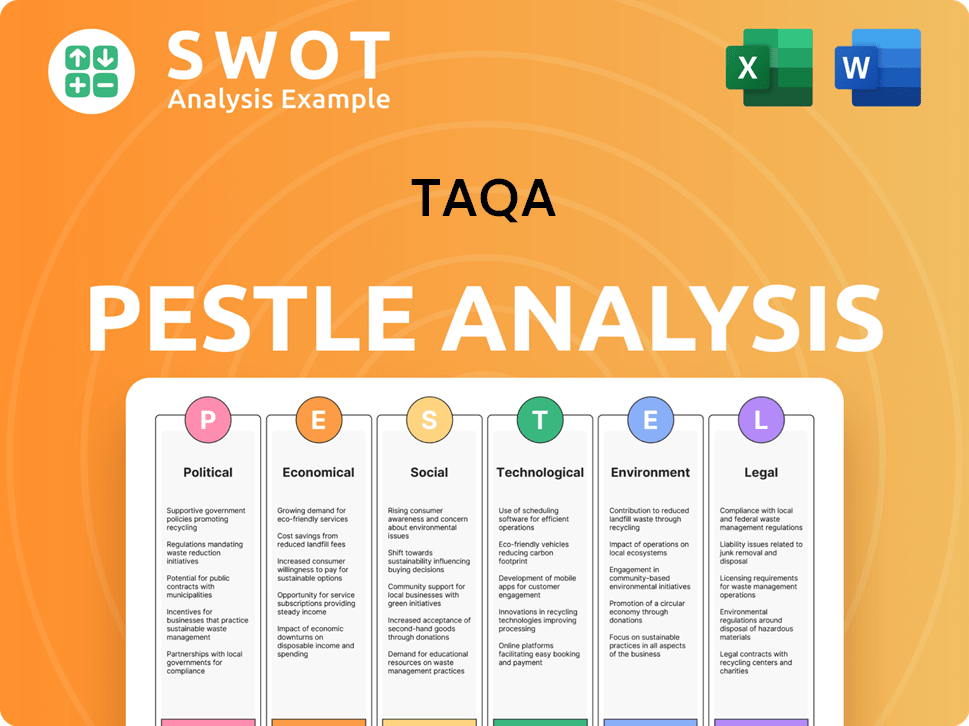
Which Strategic Decisions Have Shaped TAQA’s Business Model?
The Abu Dhabi National Energy Company (TAQA) has demonstrated significant strategic activity and operational growth throughout 2024 and into early 2025. These actions have reshaped its business model and enhanced its position in the energy market. Key moves, including acquisitions and strategic partnerships, have expanded its capabilities and geographic reach, particularly in renewable energy and water management. The company's focus on sustainable energy sources and infrastructure development reflects its commitment to adapting to global energy transition trends.
TAQA's recent milestones highlight its commitment to growth and diversification. The company has strategically invested in various sectors, including power, water, and oil & gas, to build a resilient portfolio. These expansions are supported by its strong financial backing and strategic alignment with Abu Dhabi's economic objectives. These initiatives underscore TAQA's role in the energy sector and its impact on the UAE economy.
TAQA's strategic moves and competitive advantages are pivotal for its success. The company's focus on renewable energy, coupled with its strong financial backing and strategic partnerships, positions it favorably in the evolving energy landscape. TAQA's diversified portfolio and strategic focus on renewables are key to its long-term growth. For a deeper understanding of how TAQA stands against its rivals, consider exploring the Competitors Landscape of TAQA.
In 2024, TAQA fully acquired SWS Holding, rebranding it as TAQA Water Solutions, which added approximately AED 17.5 billion in regulated assets. The merger of ADDC and AADC into TAQA Distribution was effective January 2025, aimed at enhancing customer experience. TAQA, through Masdar, acquired a 50% stake in Terra-Gen Power Holdings II in 2024, expanding its presence in the US renewables market.
TAQA, in a consortium, signed PPAs in November 2024 with SPPC to develop two new combined cycle gas power plants with a combined capacity of 3.6 GW in Saudi Arabia. In April 2025, TAQA fully acquired Transmission Investment (TI), strengthening its position in the offshore electricity transmission sector. Masdar completed three key acquisitions in Europe in 2024, furthering its global footprint.
TAQA faced operational challenges, including natural production declines and decommissioning activities in its oil and gas business. This led to a 5.9% decline in oil and gas production in 2024. Despite these challenges, the company maintained robust operational performance across its utilities businesses, demonstrating its resilience.
TAQA's competitive advantages include its diversified portfolio across power, water, and oil & gas, providing resilience. Its strong government backing, being 90% owned by ADQ, provides significant financial support. TAQA has a monopoly in Abu Dhabi's T&D network, ensuring stable cash flows. The company is actively expanding its renewable energy capacity, aiming for 150 GW of gross generation capacity by 2030, with 65% from renewables, up from 39% currently.
TAQA is adapting to new trends by investing in advanced technologies like Reverse Osmosis (RO) for desalination, which reduces energy consumption. The company is also exploring opportunities in green hydrogen and cross-border infrastructure. TAQA is poised to benefit from the rising demand for electricity driven by AI and data centers in the UAE.
- TAQA’s strategic focus on renewable energy and technological advancements positions it well for future growth.
- The company’s commitment to sustainability and innovation is evident in its investments in green technologies.
- TAQA's diversified business model and strategic partnerships enhance its ability to navigate market fluctuations.
- The company's strong financial backing and strategic alignment with Abu Dhabi's economic goals support its long-term vision.
TAQA Business Model Canvas
- Complete 9-Block Business Model Canvas
- Effortlessly Communicate Your Business Strategy
- Investor-Ready BMC Format
- 100% Editable and Customizable
- Clear and Structured Layout
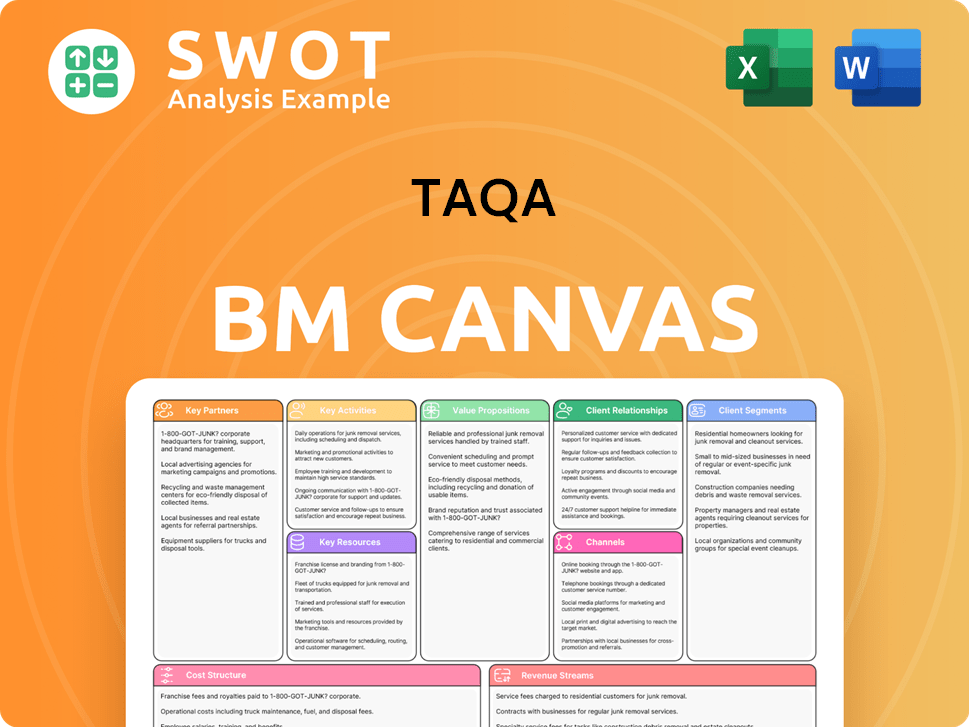
How Is TAQA Positioning Itself for Continued Success?
The Abu Dhabi National Energy Company (TAQA) holds a strong market position as a leading integrated utilities provider. As of June 2025, TAQA's market capitalization stood at €88.39 billion, making it one of the world's most valuable companies. Its monopoly in Abu Dhabi's transmission and distribution network provides a stable foundation for its TAQA operations.
TAQA's global reach extends across the UAE, Saudi Arabia, Canada, and the United Kingdom, with recent expansions into the US and Europe through Masdar. However, the company faces several risks, including oil price volatility, execution delays in large-scale projects, and regulatory changes. The company's strategy is focused on profitable and sustainable growth, including aggressive renewable energy expansion and strategic acquisitions.
TAQA is a major player in the integrated utilities sector, especially in Europe, the Middle East, and Africa. Its strong presence in Abu Dhabi's T&D network supports high customer loyalty. The company is continuously expanding its global footprint.
Key risks include oil price volatility, execution delays in major projects, and regulatory changes. Technological disruption and geopolitical shifts also pose challenges. These risks could indirectly impact TAQA's projects.
TAQA is committed to profitable, sustainable growth, with a focus on renewable energy. Strategic initiatives include aggressive expansion in renewables, decarbonization of water desalination, and strategic acquisitions. TAQA aims to lead the energy transition and meet evolving global energy and water demands.
TAQA's business model is based on integrated utilities, including generation, networks, and growth pipelines. The company focuses on infrastructure investment, innovation, and sustainable growth. You can learn more about the Target Market of TAQA.
TAQA's strategic initiatives include aggressive renewable energy expansion, aiming for 150 GW gross generation capacity by 2030. The company is also focused on the decarbonization of water desalination, aiming for over 90% of its water production from RO technology by 2030.
- Aggressive Renewable Energy Expansion.
- Decarbonization of Water Desalination.
- Strategic Acquisitions and Partnerships.
- Innovation and Digital Transformation.
TAQA Porter's Five Forces Analysis
- Covers All 5 Competitive Forces in Detail
- Structured for Consultants, Students, and Founders
- 100% Editable in Microsoft Word & Excel
- Instant Digital Download – Use Immediately
- Compatible with Mac & PC – Fully Unlocked
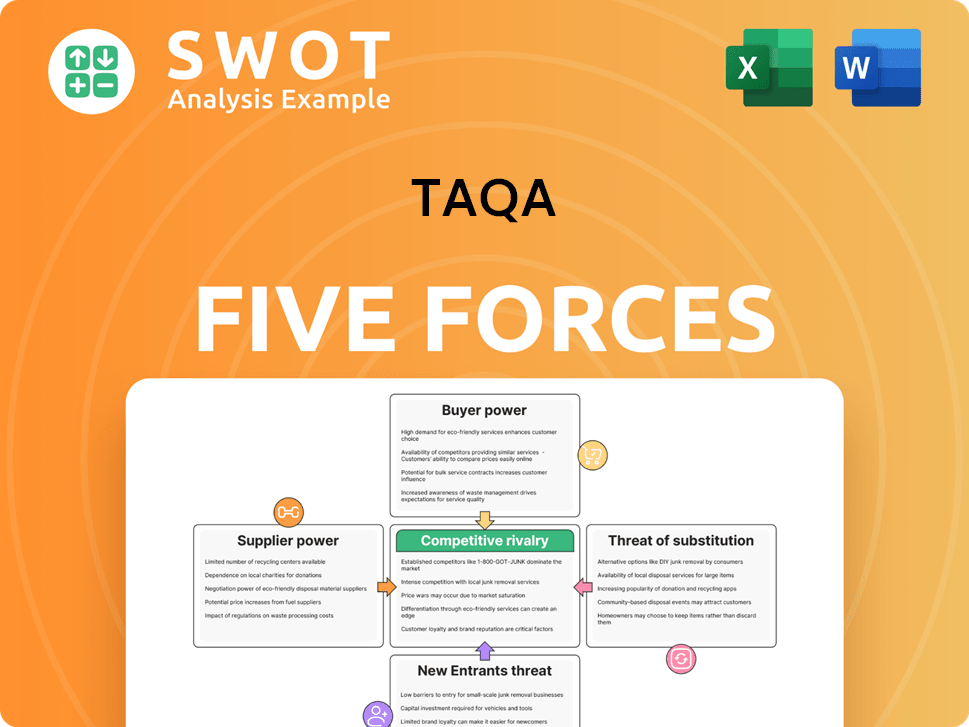
Related Blogs
- What are Mission Vision & Core Values of TAQA Company?
- What is Competitive Landscape of TAQA Company?
- What is Growth Strategy and Future Prospects of TAQA Company?
- What is Sales and Marketing Strategy of TAQA Company?
- What is Brief History of TAQA Company?
- Who Owns TAQA Company?
- What is Customer Demographics and Target Market of TAQA Company?
Disclaimer
All information, articles, and product details provided on this website are for general informational and educational purposes only. We do not claim any ownership over, nor do we intend to infringe upon, any trademarks, copyrights, logos, brand names, or other intellectual property mentioned or depicted on this site. Such intellectual property remains the property of its respective owners, and any references here are made solely for identification or informational purposes, without implying any affiliation, endorsement, or partnership.
We make no representations or warranties, express or implied, regarding the accuracy, completeness, or suitability of any content or products presented. Nothing on this website should be construed as legal, tax, investment, financial, medical, or other professional advice. In addition, no part of this site—including articles or product references—constitutes a solicitation, recommendation, endorsement, advertisement, or offer to buy or sell any securities, franchises, or other financial instruments, particularly in jurisdictions where such activity would be unlawful.
All content is of a general nature and may not address the specific circumstances of any individual or entity. It is not a substitute for professional advice or services. Any actions you take based on the information provided here are strictly at your own risk. You accept full responsibility for any decisions or outcomes arising from your use of this website and agree to release us from any liability in connection with your use of, or reliance upon, the content or products found herein.